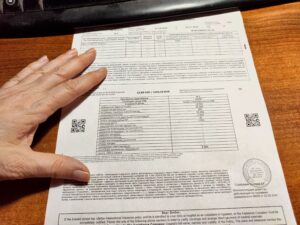Our Chesterfield car accident lawyers often hear this question from clients involved in car accidents. The truth is, there’s no one-size-fits-all answer. Each car accident claim is different, and its value depends on many factors.
Key takeaways to remember:
- Every car accident claim is different
- Keep documentation of injuries, expenses, and the accident itself
- Consider both current and future impacts of the accident on your life and finances
- Don’t rush to accept the first settlement offer without fully understanding it
- An experienced car accident attorney can help assess the value of your claim
Factors that determine the value of a car accident claim
Severity of injuries

The extent and severity of injuries sustained in a car accident play a role in determining the value of a claim. More severe injuries may result in higher compensation due to:
- Higher medical expenses
- Longer recovery periods
- Greater impact on quality of life
- Potential long-term or permanent disabilities
For instance, a claim involving a spinal cord injury with permanent paralysis will likely be “worth” more than a claim for minor whiplash that resolves within a few weeks.
Common injuries in car accidents and their potential impact on claim value include:
- Whiplash: Severe cases can lead to chronic pain and limited mobility.
- Broken bones: The fracture and recovery time can affect claim value.
- Traumatic Brain Injuries: These can range from mild concussions to severe cognitive impairments, with long-lasting effects on daily life.
- Spinal cord injuries: Partial or complete paralysis can result in lifelong care needs and claim values.
- Internal injuries: Damage to organs may require emergency surgery and extended recovery periods.
- Psychological trauma: Post traumatic stress disorder, anxiety, and depression resulting from the accident are also considered when valuing a claim.
Medical expenses
Medical costs are often one of the most significant components of a car accident claim. These expenses may include:
- Emergency room visits
- Hospital stays
- Surgeries
- Medication
- Physical therapy
- Rehabilitation
- Future medical care (for long-term injuries)
Keep detailed records of all medical expenses related to your accident, as these will play a part in calculating your claim’s value. This includes:
- Ambulance fees
- Diagnostic tests (X-rays, MRIs, CT scans)
- Doctor’s appointments
- Specialist consultations
- Medical devices (crutches, wheelchairs, prosthetics)
- Home care services
- Anticipated future medical treatments
Remember, it’s not just about the immediate medical costs. Long-term or chronic conditions resulting from the accident can increase the value of your claim.
For example, if you require ongoing pain management or multiple surgeries over several years, these future expenses should be factored into your claim’s value.
Lost wages and loss of earning capacity
If your injuries prevent you from working, you may be entitled to compensation for lost wages not covered by no-fault insurance. This includes:
- Salary or hourly wages you’ve already lost due to missed work
- Potential future earnings if you’re unable to return to your job
- Loss of earning capacity if your injuries affect your ability to earn as much as you did before the accident
For example, if a construction worker suffers a severe back injury that prevents them from returning to their physically demanding job, their claim may include compensation for the difference between their previous income and what they can earn in a less physically demanding role.
When calculating lost wages and loss of earning capacity, consider:
- Base salary or hourly wage
- Overtime pay
- Bonuses and commissions
- Employee benefits (health insurance, retirement contributions)
- Projected career advancement and salary increases
- Impact on future job prospects and earning potential
Some limited lost wages are covered by no-fault insurance.
Pain and suffering
Pain and suffering is a non-economic damage that compensates you for the physical pain and emotional distress caused by the accident and your injuries. Factors that can influence the value of pain and suffering include:
- The nature and extent of your injuries
- The duration of your recovery
- The impact on your daily life and activities
- Psychological effects such as anxiety, depression, or PTSD
A lot goes into calculating pain and suffering. Insurance companies often use formulas or computer programs to estimate these damages for internal purposes.
Permanent disability or disfigurement
If your injuries result in permanent disability or disfigurement, this can increase the value of your claim. Compensation may cover:

- Lifelong medical care and assistance
- Modifications to your home or vehicle
- Loss of enjoyment of life
- Emotional distress related to disfigurement
For example, a claim involving the loss of a limb or severe burns resulting in visible scarring would likely have a higher value due to the long-term impact on the victim’s life. Factors considered in valuing permanent disabilities include:
- The degree of disability (partial vs. total)
- The impact on your ability to work and earn a living
- The need for ongoing medical treatment or assistive devices
- The effect on your personal relationships and social life
- The psychological impact of living with a disability or disfigurement
Liability and negligence
The degree of fault in the accident can affect your claim’s value. Factors that can influence the determination of fault include:
- Traffic violations (speeding, running red lights, etc.)
- Distracted driving (texting, eating, etc.)
- Drunk or impaired driving
- Failure to yield right-of-way
- Poor road conditions or malfunctioning traffic signals
Insurance policy limits
It’s important to note that many drivers carry higher coverage limits than the state minimum. Your attorney can help investigate all available insurance coverage to maximize your compensation.
Multiple parties involved
In these cases, factors to consider include:
- The degree of fault for each party involved
- The number of injured parties
- The insurance coverage available from each party
- Potential for joint and several liability
Multi-party accidents often require extensive investigation and negotiation to determine fair compensation for all parties involved. These cases may involve:
- Chain-reaction collisions
- Commercial vehicle accidents (involving trucking companies or other businesses)
- Accidents caused by road debris or construction
- Collisions involving pedestrians or cyclists
In such scenarios, having experienced legal representation helps ensure your rights are protected and you receive the compensation you need.
Punitive Damages
In rare cases, punitive damages are awarded. These are intended to punish the at-fault party for extreme behavior and deter similar conduct in the future.
Maximizing the value of your car accident claim
To help your car accident claim, consider the following steps:
- Get immediate medical attention and follow all treatment recommendations
- This creates a clear link between the accident and your injuries and hopefully helps you feel better sooner
- It demonstrates that you’re taking your recovery seriously
- Document everything related to the accident and your injuries
- Take photos of the accident scene and your injuries if safe and practicable
- Keep detailed records of all expenses and lost wages
- Save all medical bills, receipts for related expenses (like medication or medical devices)
- Document missed workdays and any lost opportunities due to your injuries
- Avoid discussing the accident on social media
- Insurance companies may use your posts to dispute your claim
- Even seemingly innocent posts can be taken out of context
- Don’t provide recorded statements to insurance companies without legal advice
- Anything you say can be used to minimize your claim
- Let your attorney handle communications with insurance companies
- At the same time, you have a duty to cooperate with your insurance company. An experienced attorney can help determine what communications are necessary.
- Consider future expenses not covered by no-fault insurance and long-term impacts when evaluating settlement offers
- Don’t rush to accept the first offer, as it may not account for ongoing or future needs
- Consult with an experienced car accident attorney
- An attorney can provide a realistic assessment of your claim’s value
- They can negotiate on your behalf and, if necessary, take your case to court
The Role of a Car Accident Attorney
An experienced car accident attorney enhances the value of your claim by:
- Conducting a thorough investigation of the accident
- Gathering police reports, witness statements, and surveillance footage
- Working with accident reconstruction experts if needed
- Gathering and preserving evidence
- Obtaining medical records and expert opinions on your injuries
- Collecting evidence of property damage and other losses
- Identifying all potentially liable parties
- Looking beyond just the other driver (vehicle manufacturers, government entities)
- Exploring all possible sources of compensation
- Accurately calculating the full extent of your damages
- Considering both current and future medical expenses
- Factoring in long-term impacts on earning capacity and quality of life
- Negotiating with insurance companies on your behalf
- Leveraging their experience to counter lowball offers
- Presenting a compelling case for the full value of your claim
- Representing you in court if a fair settlement cannot be reached from the other side
- Preparing a strong case for trial
- Advocating for your rights before a judge and jury
Our team of experienced attorneys has extensive experience handling car accident claims. We understand the law and how to maximize the value of your claim.
Determining the worth of a car accident claim is a detailed process that depends on numerous factors. While it’s natural to want a quick answer, the reality is that each case requires careful evaluation.
Our Chesterfield personal injury lawyers committed to helping our clients understand the value of their claims and fighting for maximum compensation.
If you’ve been involved in a car accident, don’t leave the value of your claim to chance. Call (866)-388-1307 today for a free consultation.


